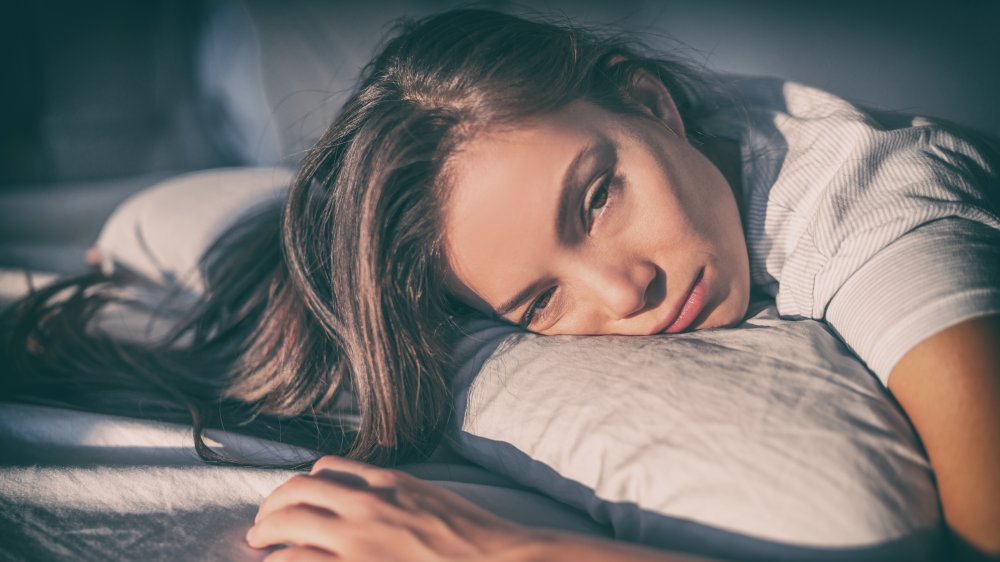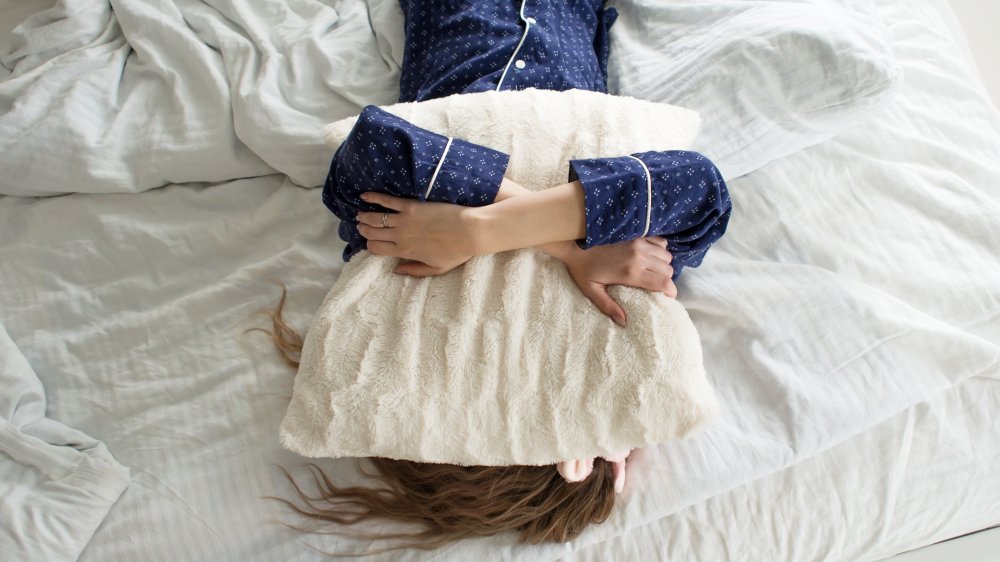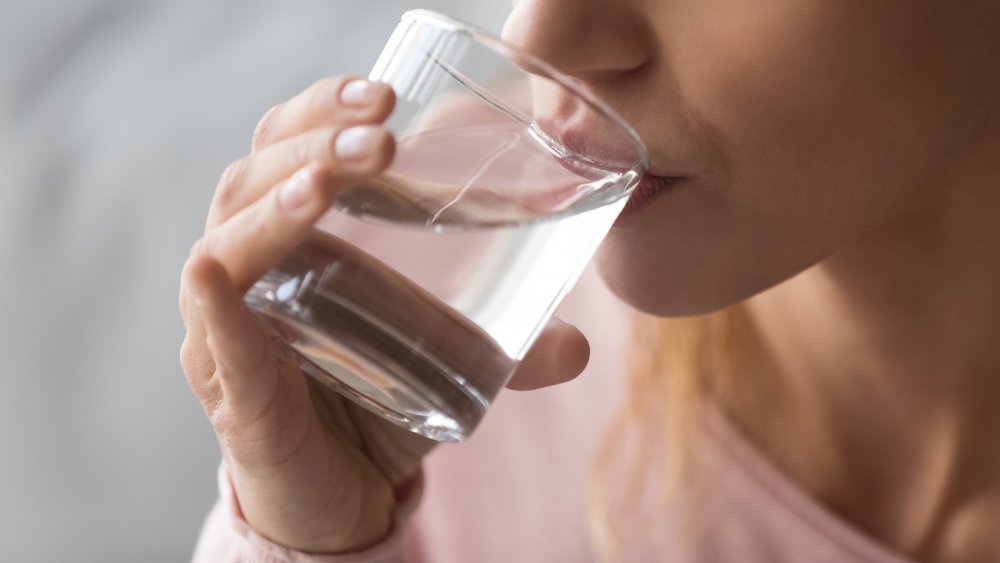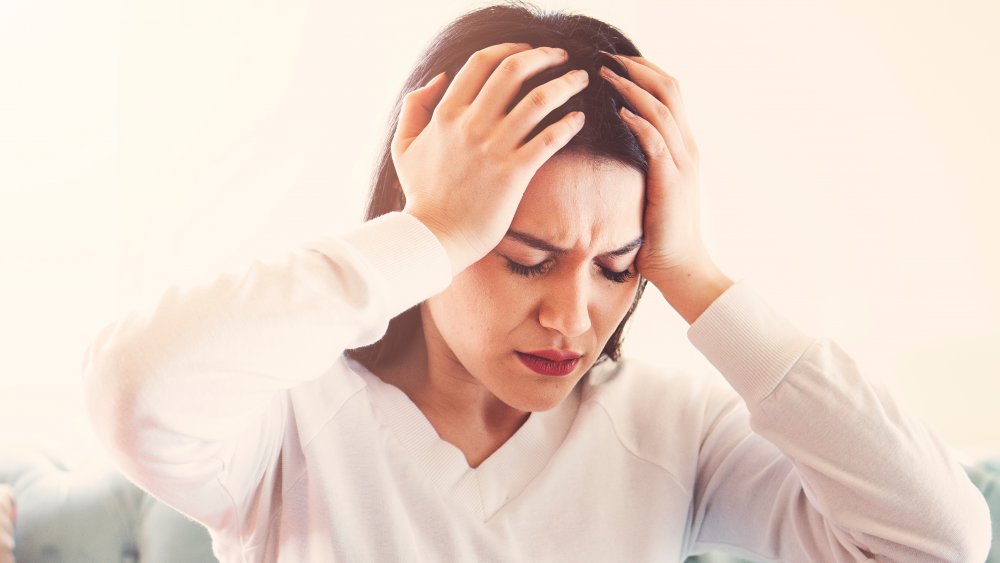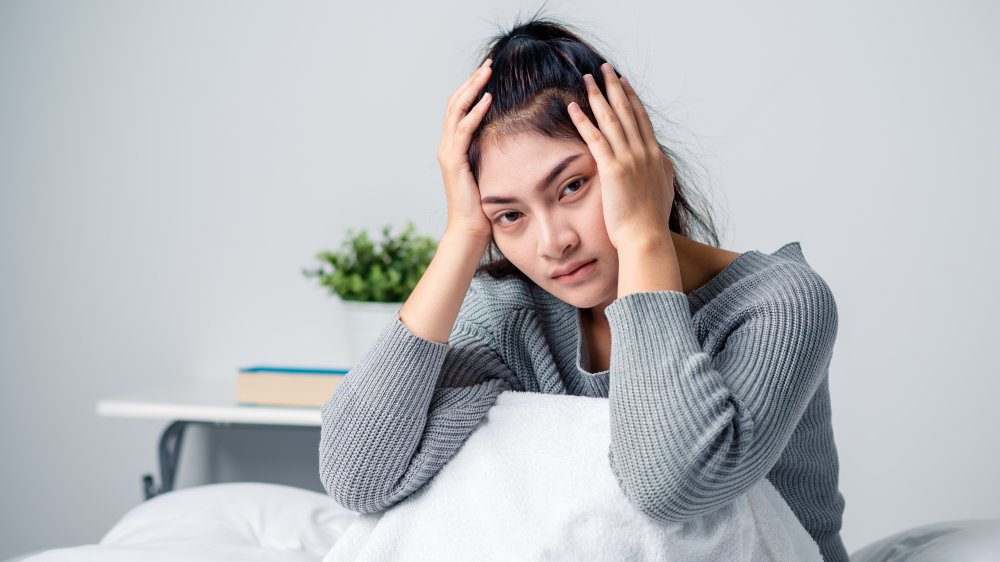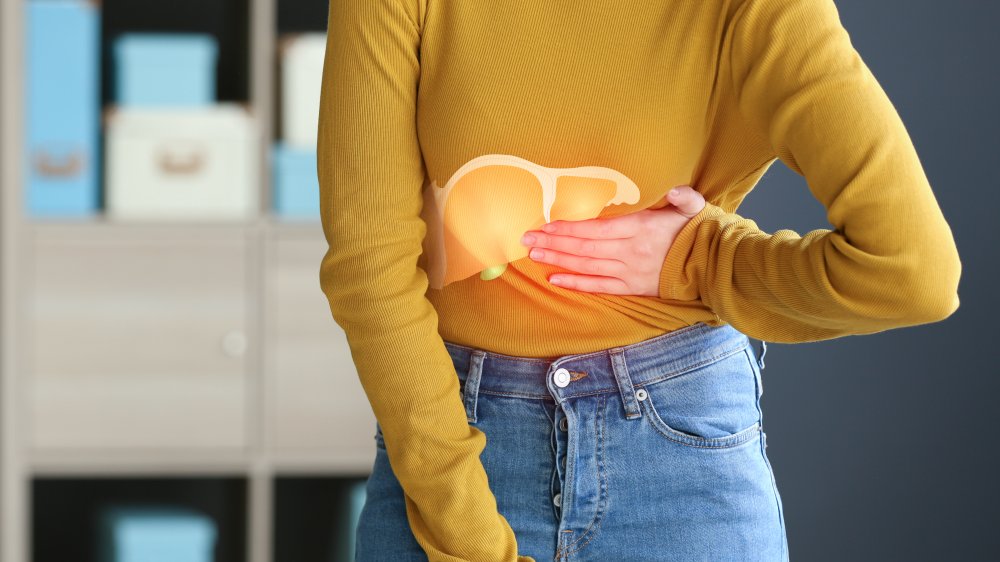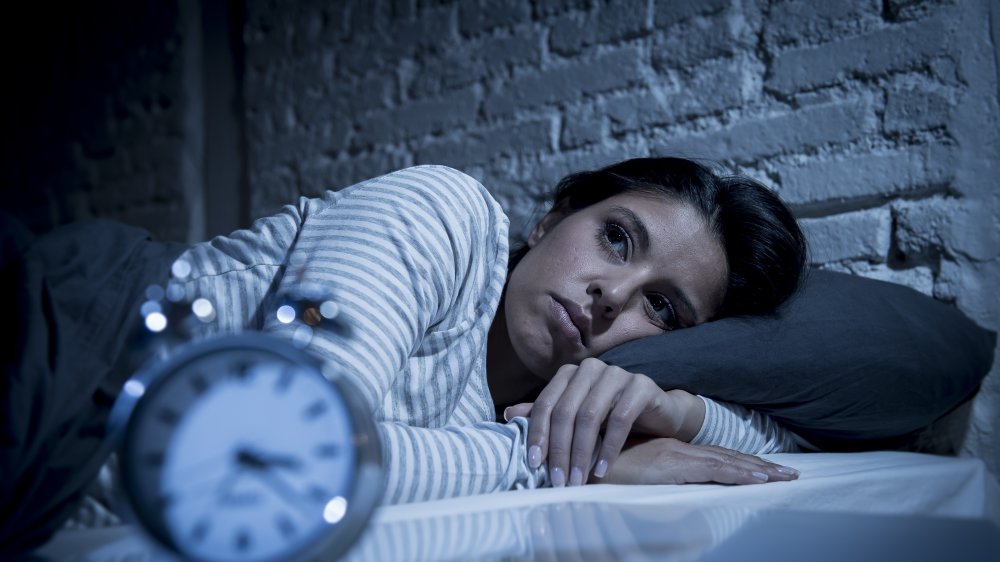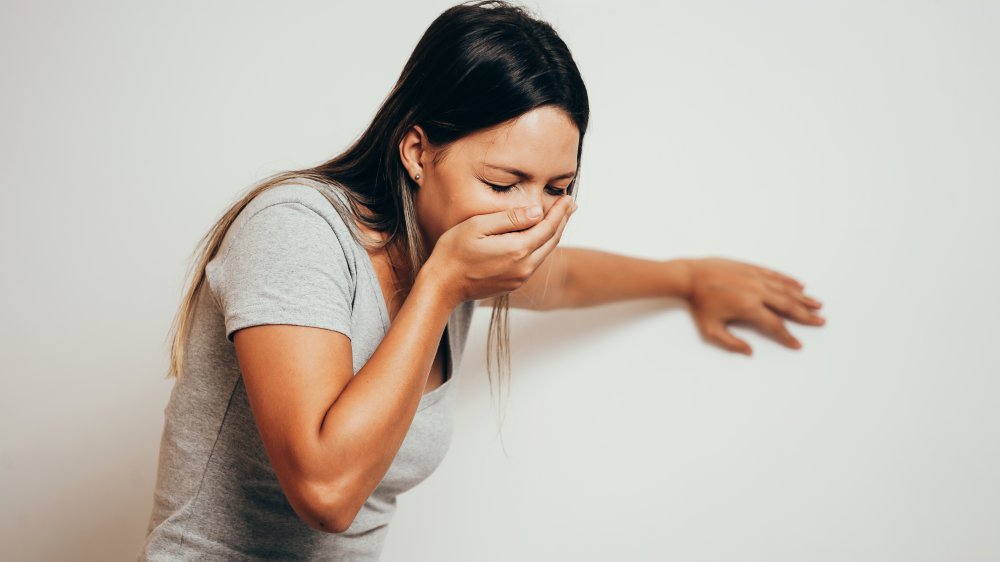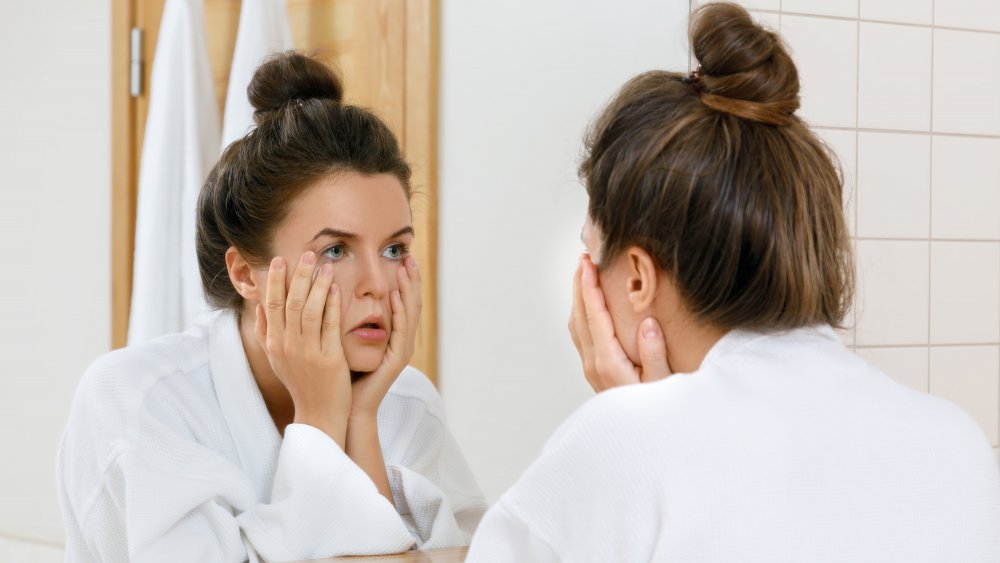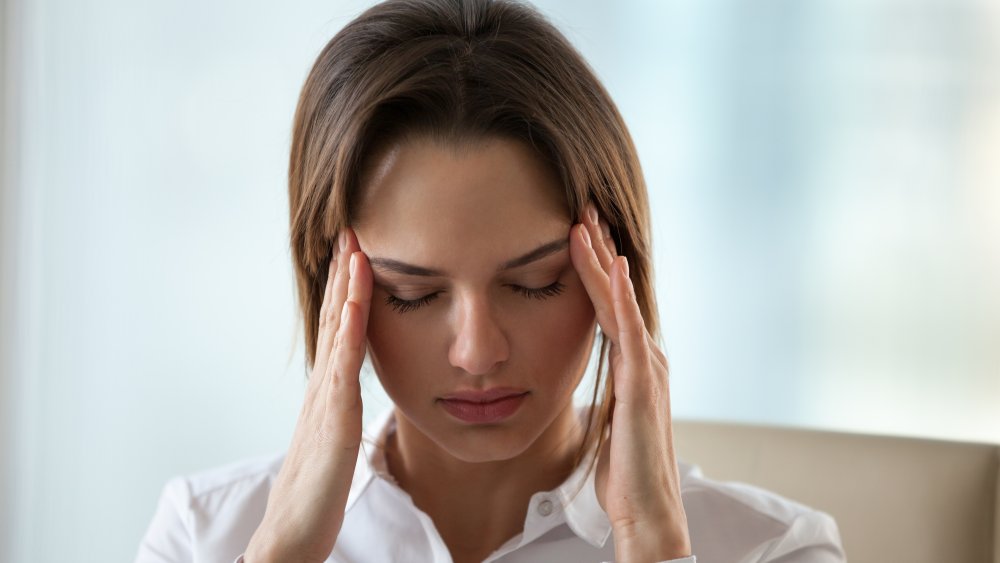When You Have A Hangover, This Is What Happens To Your Body
When you have a hangover, it makes starting your day difficult, as it's just about the worst way to wake up. Whether you went too hard at the bar the night before or just had a few too many glasses of wine while watching Netflix, a hangover is a brutal thing to deal with. There's no real cure for a hangover, and the "hair of the dog" can just make things worse.
There's a lot about hangovers that might surprise you, even if you consider yourself to be a professional drinker with your own personal hangover cure-all. There's only so much that green juice or a greasy burger can do to help. At the end of the day, hangovers suck, but what they do to your body sucks even more. Hangovers aren't just a pain in the neck to deal with, but they also do a lot of damage to your body. While not everyone will experience a hangover in the same way, a hangover is the same in one regard: It's inconvenient. Here's what happens to your body when you have a hangover.
Your body is basically going through withdrawal when you have a hangover
The main reason you have a hangover after you drink too much is that your body is having a hard time adjusting to zero alcohol intake. When you go from downing tequila shots and chugging beers all night to having nothing, your body struggles with how to handle it. In short, a hangover is basically alcohol withdraw, as Dr. Jerrold B. Leikin, the director of medical toxicology at NorthShore University HealthSystem, told Vice.
Additionally, the reason why a hangover feels like a withdraw has a lot to do with your mind and body. "Heavy drinking depresses the central nervous system," according to Verywell Mind. "When alcohol is withdrawn, the central nervous system can go into an unbalanced hyperactivity state or an 'overdrive' state." That overdrive state then causes an increase in heart rate, as well as body shakes, which are just part of what make hangovers so difficult to deal with.
The more you drink, the worse your hangover will be
Of course, if you only drink one glass of wine with dinner, you probably aren't going to have a hangover. While it may be obvious, drinking too much alcohol is what causes a hangover, but what that alcohol does in your body is pretty interesting. You see, the more alcohol you drink, the more toxic it becomes, and it actually changes the way your body absorbs it.
"As it's being metabolized, alcohol is oxidized into a substance called acetaldehyde, which makes you feel awful," Dr. Jerrold B. Leikin, the director of medical toxicology at NorthShore University HealthSystem, told Vice. "Acetaldehyde is a really toxic metabolite. It's more toxic than alcohol itself in a lot of ways. If you get too much of it, you'll feel dysphoric, you'll start to feel nauseous, your head will start to hurt, and it can exacerbate depression." Hence, the more you drink, the worse your hangover tends to be.
Your body is very dehydrated when you have a hangover
Most people don't drink enough water when they're out taking shots. But if they did, they might be able to make the next day's nasty hangover less miserable. Why? Well, when you have a hangover, your body is very dehydrated for a number of reasons.
First of all, alcohol alone is super toxic, and your body has to work hard to process it. As registered dietitian Ginger Hultin told Eating Well, when you drink too much, you've "introduced a very irritating substance to the body and it has to process and eliminate it," and "dehydration is part of it." Additionally, Dr. Jerrold B. Leikin explained to Vice that your electrolytes are "likely at abnormally low levels" when you're dehydrated as a result of a hangover.
So, if you can remember to, drink plenty of water while you're enjoying your night out, or else your hangover will be that much worse.
Your body needs vitamins when you have a hangover
Because alcohol is poison in a sense, it robs your body of a lot of essential vitamins and minerals it needs to function properly. When you drink too much and end up with a hangover the next day, your body is probably majorly missing out on some proper nutrition in the form of vitamins, and one kind in particular.
Jordanna Quinn, DO, MS, told Eat This, Not That! that, when you have a hangover, it is the result of a lack of vitamin B. "Alcohol also depletes your body of B vitamins, particularly thiamine, or B1," she said. "Chronic use of alcohol does this to a much more major degree." Fortunately, if you drink plenty of water and take vitamin B before heavy drinking, it can lessen the hangover symptoms you experience. Of course, if you forget to take them before drinking, taking them as soon as you wake up the next day could also help that hangover end sooner rather than later, and that's a definitely plus.
Your stomach will be inflamed if you have a hangover
One of the worst side effects of a hangover is the stomach pain you might feel. Even if you didn't indulge in a 3 a.m. Taco Bell run, it might feel like you did because of all the alcohol you consumed. But when you have a hangover, your stomach isn't just upset – it's literally inflamed.
Dr. Jerrold B. Leikin, NorthShore University HealthSystem's director of medical toxicology, told Vice that alcohol irritates the stomach, which can lead to you experiencing nausea when you have a hangover. Alcohol actually "causes gastritis, or inflammation of the stomach lining," he added. On top of that, Leikin explained that when you drink too much alcohol, it "stimulates the pancreatic enzymes, which makes the pancreas secrete more than usual." Besides potentially causing nausea, all of that irritation can lead to vomiting and diarrhea. Yeah, that does not paint a pretty picture.
Hangovers are already pretty miserable, but add in some stomach inflammation and you've got yourself a pretty wretched day ahead of you. Honestly, knowing what alcohol does just to your stomach might make you rethink that third margarita.
You'll get terrible sleep after a night of drinking
There are obvious symptoms of a hangover, like a headache and nausea, but there are also symptoms that are a little more underlying but still significant. For instance, most people who are hungover will experience a terrible night of sleep after their night out. And for some people, a hangover means feeling exhausted during the day, but unable to get any rest.
As Dr. Nancy Crowell, DOM, told Eat This, Not That!, "When you have a hangover, you're likely experiencing dehydration, irritation of the GI, electrolyte imbalance, low blood sugar, and difficulty sleeping." The effect of alcohol on sleep quality is so consequential that a 2017 study looked at it and concluded that "heavy alcohol consumption significantly reduces sleep quality, and significantly increases daytime sleepiness the following day."
Unfortunately, there aren't a lot of ways to help with sleep quality while hungover, other than to, well, not get hungover.
When you have a hangover, your liver works overtime
One of the largest and most important organs in the human body is the liver, which filters and detoxifies just about everything you consume, as well as your blood. Unfortunately, when you have a hangover, you've consumed too much alcohol, which causes your liver to work overtime, and you can actually damage your liver if you aren't careful.
Hepatologist Dr. Tarek Hassanein, the director of the Southern California Liver Centers, told Eat This, Not That!, "Alcohol goes to your liver before all other parts of the body." While it's in your liver, your body metabolizes alcohol, Hassanein explained, and it is broken down "into toxic compounds which are then distributed throughout the body." It takes a lot of work for your liver to accomplish this, and the more you drank, the harder your liver has to work. So, as Women's Health noted, it's important not to "traumatize it further with more liver stressors like acetaminophen painkillers" like Tylenol. Your liver needs a break when you have a hangover, so try to give it one.
You won't be able to focus well when you have a hangover
As much as alcohol impacts your body, it also impacts your mind, even the next day. Yes, when you have a hangover, you might have a hard time concentrating or even remembering something. So while you could have stopped drinking hours ago, a hangover still messes with your brain.
In fact, a 2018 study published in the journal Frontiers in Human Neuroscience found "everyday PM [prospective memory] deficits are associated with a state of AH [alcohol hangover]." And, as Aaron White, senior scientific adviser to the director of the NIAAA, told BuzzFeed News, a hangover plays an important role in brain function. "You get the double whammy of malaise from a toxic event and the effects of an acute mini withdrawal that comes from even one night of drinking," he explained. This makes it more difficult for you to focus and use your motor skills.
You'll urinate a lot when you have a hangover
When you have a hangover, you'll likely be making a lot of trips to the bathroom. And not all of them are because your stomach is inflamed. On the contrary, you tend to have to urinate more while you're hungover, mostly because your kidneys are in trouble.
According to HuffPost, when you drink too much and end up with a hangover, "your kidneys will really kick into gear" and you may find yourself urinating more often than usual. Additionally, Dr. Jordanna Quinn, DO, MS, told Eat This, Not That! that "alcohol turns off the process in your kidneys that signal [to] your brain that you're thirsty." Because of that, "you end up urinating out all of your fluids," Quinn explained.
Having to constantly run to the bathroom while you are hungover isn't fun, but flushing out the toxins in alcohol is important. Drinking lots of water and staying hydrated will help you feel a little better, but running to pee every five minutes is the price you pay for buy one, get one vodka shots.
Your blood vessels retract when you have a hangover
Not only does drinking too much lead to questionable decisions in many cases, but it can also cause some serious pain. Getting a headache the morning after drinking is super common and is a typical part of the lovely hangover experience. But what you might not know is why you have a hangover. Spoiler alert: it's not just because you're dehydrated (even though you definitely are).
According to Dr. Jerrold B. Leikin, you experience vasodilatation, or "expansion of the blood vessels," when you drink, as he told Vice. "Any time blood vessels expand or contract, there is going to be pain," he explained. "It can be expected that alcohol hangovers can exacerbate migraines for this reason." Taking painkillers can definitely dull the sharp feeling, but a headache is just par for the course as far as hangovers are concerned. It's best to drink water and use that pain as a reminder to maybe not throw back as many drinks next time.
You may feel anxious when you have a hangover
When you have a hangover, on top of all the physical side effects your body is experiencing, you may also have to deal with some mental side effects. Hangovers can cause anxiety. According to HuffPost, there are people who may experience "increased anxiety" after drinking alcohol. While not everyone experiences hangover anxiety, there's a reason it's a common occurrence for many. Eat This, Not That! explained, "When alcohol leaves the bloodstream, you can experience a 'rebound effect' in which glutamate springs into action, making you feel jittery, irritable or down."
Anxiety is certainly an unfortunate consequence of drinking too much, though not everyone experiences it. One 2012 study published in Alcohol and Alcoholism found that 7.4 percent of people surveyed reported anxiousness as a hangover symptom.
Going for a walk or even taking a nap might help ease the hangover symptoms you experience, so, if you're suffering from intense anxiety after drinking, exercise or sleep might be worth a try.
The older you are, the worse your body will feel when you have a hangover
People often complain that they can't handle a night out like they could in college, and they're actually right. The older you are, the worse a hangover's impact on your body is. But that actually has more to do with how much you've drunk over the years and less to do with your actual age.
Christopher Roselle, a cellular expert at the University of Pennsylvania, told HuffPost, "Hangovers get worse as we age because every time we drink, we deplete vital resources [in] our body that help break down and process alcohol." Roselle explained that when we drink we "use ammo to defend against the toxins created by alcohol, and over time, we have less and less ammo." So, as you get older, you're less resilient against the effects of alcohol and have a harder time combatting hangover symptoms, especially since we "secrete lower concentrations of liver enzymes" as we get older.
So unfortunately, the more hangovers you've had to deal with in your life, the worse you're going to handle hangovers in the future.
When you have a hangover, you may experience bloating
If you've ever woken up from a night of drinking and not only felt horrible but looked pretty bad, too, you aren't alone. Drinking too much alcohol actually leads to bloating, especially in your face. Yes, there's a reason you feel puffy and less than your best when you have a hangover, and it's because all those glasses of wine are causing you to bloat in some really unflattering ways.
Dr. Stephen Davis, DO, who has a cosmetic surgery practice in New Jersey, told Eat This, Not That!, "Alcohol dilates the blood vessels and leads to dehydration, causing the body to bloat." To combat all that bloat you may see or feel in your face, Davis recommends you "massage your face and jawline to boost circulation and encourage lymphatic drainage." You could use a jade roller or rub ice cubes on your face. Of course, that might be easier said than done when you feel horrible during a hangover, but it may just help your face become less bloated from all the alcohol you drank the night before.
When you have a hangover, your hormones could be unbalanced
No one wants to hear that their hormones are messed up, but, when you have a hangover, that can happen. Drinking too much can lead to your hormones becoming unbalanced, and that itself can lead to some other issues.
Dr. Nancy Crowell told Eat This, Not That! that a hangover is often associated with disturbed hormones. "For many of my patients, alcohol drives their hormonal imbalances and gut dysbiosis," she said. In fact, a study published in Endocrinology and Metabolism Clinics of North America in 2013 reported, "Chronic consumption of a large amount of alcohol disrupts the communication between nervous, endocrine and immune system and causes hormonal disturbances..." Additionally, the study explained that when your hormones are unbalanced due to alcohol, it can lead to thyroid problems, reproductive issues, stress, a poor immune system, bone disease, and even cancer. If you're concerned about how alcohol may be effecting your body, talk to your doctor.

